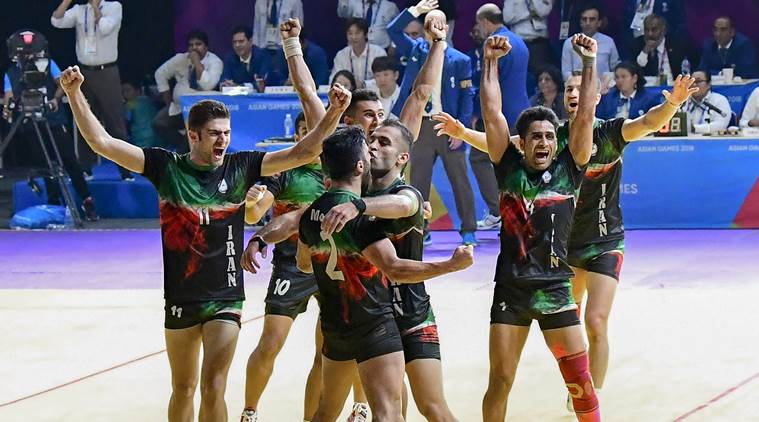 Iranian players celebrate after winning the semifinal against India on Thursday. They will face Korea in the final. (PTI Photo)
Iranian players celebrate after winning the semifinal against India on Thursday. They will face Korea in the final. (PTI Photo)
One player has started weeping. Another sits on the floor, scratching the back of his head. Nearby, a muscular defender grinds his teeth in anger. In the corner, captain Ajay Thakur sits still with his head bandaged – he has not changed position for a minute, which probably feels like a lifetime for him. Together, they all stare into nothingness.
This is the image of the 12 men that make up the Indian men’s kabaddi team at the Asian Games. This is the image of the players after an unexpected 27-18 loss to Iran in the semifinals. This is the image they will leave at the Asian Games, after 28 years of dominance.
The image of fallen heroes.
On the other side of the court, the wrestlers-turned-kabaddi players from Iran dance to the sound of victory. It’s a synchronised effort, just like the tackles they inflicted on the much-hyped Indian raiders for the duration of the match.
“The thing about Iran,” assistant coach Srinivas Reddy had told The Indian Express in June, “they have very strong defenders, but are weak while raiding. India is an all-round team.”
There was nothing incorrect in that statement. The advent of kabaddi’s most glamourous league, the Pro Kabaddi League, has put each and every Indian player in the limelight. Each defender is an impenetrable force, each raider can squeeze through the tiniest hole in a mangle of piling bodies. Individually, they are all household names, four of them are among the sport’s first six crorepatis. They’re all superstars.
But together, they couldn’t put up an all-star performance worthy of the kabaddi ‘Dream Teams’ that won seven consecutive gold medals since the sport was introduced at the Asian Games in 1990.
In hindsight though, the debacle was on the cards.
At the last Asian Games in 2014, held just weeks after the inaugural season of the PKL had made the selected squad poster boys of the sport, the gold medal was captured with a slim and nervy two-point win over Iran. India’s skipper at the time Rakesh Kumar had called it “a match India should not have won.”
Four years later, at the Theatre Garuda in Jakarta, the shock came.
No longer is India the undisputed champion of a game that originated in the country. South Korea and Iran both made sure of that by beating the powerhouse, and will now compete in the final – a spot the Indians took for granted.
Thakur had warned a few months back of overconfidence creeping into the squad. It got the better of them when they lost their opening match at the 2016 World Cup in Ahmedabad against the Koreans. And there was a hint of that bullishness when the team for the Asian Games was announced.
Two months back, at the Kabaddi Masters Dubai, an event developed and staged to showcase the country’s might and superiority on the global stage, India entered with a squad that, save for two changes, went on to play at Jakarta.
The Iranians, in turn, had taken hard the shock defeat to Pakistan last November at the Asian Championships. So for Dubai, Iran’s coach Gholamreza Mazandarani brought in nine new players and dropped the likes of captain Fazel Atrachali, Abozar Mighani and Mairaj Sheykh (the third didn’t make it to the Asian Games team).
For Mazandarani, the exhibition tournament would help them prepare for Jakarta. “We’ll get a glimpse of the other teams, what their strategies are, what they can do. With that we can build our own strategy against other teams,” he said.
Crucially, India did not change or shuffle its squad from Dubai – there was no innovation. There was also no balance between experienced players and fresh legs. Barring Thakur, none of the other stars in the team had been to an Asian Games before, and none of them knew of the pressure of performing in the sport’s biggest event.
On the evening India lost its first ever match at the Asian Games, the Iranians had done their homework. India’s star raiders were tormented by Iran’s defenders – captain Atrachali was not tagged out at all. Instead Rishank Devadiga, Pardeep Narwal, Monu Goyat, Deepak Hooda and Thakur himself were toothless in attack.
At home, they are all renowned names, faces that would now be unknown in only small pockets of the country. These are the players that have lit up PKL matches time and again.
That overconfidence and stardom backfired when it mattered most, at the Asian Games.
In another era of another sport, the United States staked an unassailable claim on basketball. It was a homegrown sport that the Americans dominated at the Olympics, from basketball’s first appearance at the Olympics in 1936 to its seventh in 1968. Nobody could touch them. On the eighth try though, the Soviet Union won gold, albeit in controversial circumstances.
A few generations later, India propelled its own homegrown kabaddi onto the continental domain. The domination again lasted for seven editions. But for the defeat in the eighth event, the Indians have only themselves to blame.